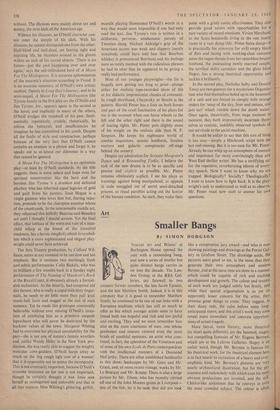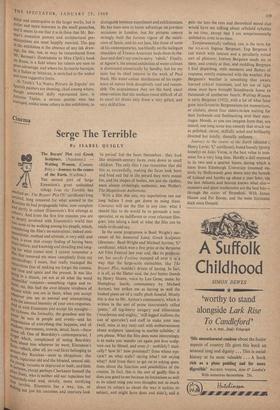Art
Smaller Bangs
By SIMON HODGSON
'ITALIAN art and Britain' at Burlington House opened the year with a resounding bang, and now a series of smaller but quite distinct bangs carries us on into the decade. The Lon- don Group, at the RBA Gal- leries, say farewell to two eminent former members, the late Jacob Epstein, and the late Matthew Smith. Indeed, it is in this company that it is good to remember Matthew Smith; he continued to be one of our links with a European tradition which has still so much to offer us but which younger artists seem to have found both too hopeful and rich and too joyful and exciting. They and we must remember him also as the most courteous of men, one whose gentleness and interest covered even the most brash of youthful opinions; an artist who com- bined, in fact, the splendour of the Venetians and of some of his own Ecole de Paris contemporaries with the intellectual manners of a Desmond McCarthy. There are other established landmarks in this show, landscapes by Mr. Gore and Mr. Grant, and, of more recent vintage, works by Mr. Le Brocquy and Mr. Knapp. There is also a large picture by Mr. Tilson, who has recently carried off one of the John Moores prizes in Liverpool— one of the few, let it be said, that did not look like a compromise jury award—and who is now showing paintings and drawings at the Portal Gal- lery in Grafton Street. The drawings aside, the pictures seem good to me, in the sense that they generate their own atmosphere and sombre flavour, and at the same time are done in a manner .which could be capable of rich and exciting development and growth. The colour and texture of each work are judged subtly but firmly, and while 'their spatial organisation is as yet an apparently lesser concern for the artist, they promise great things to come. They suggest, in their dusty reds, the calm before some long- anticipated storm, and this artist's work may soon reveal more immediate and concrete apprehen- sions of actual tragedy.
More literal, more literary, more theatrical (in short quite different), are the haunted, stageY, but compelling fantasies of Mr. Eugene Berman, which are at the Lefevre Galleries. Stagey is an unfair word, though Mr. Berman is famous for his theatrical work, for the theatrical element here is in fact nearer to surrealism of a heavy and over- emphatic kind. Mr. Berman's pictures are very nearly architectural illustration, but for the ser- iousness and melancholy with which even his most obvious productions are invested, and the still' Chirico-like airlessness that he conveys in even the most crowded subject. The colour is often bitter and unattractive in the larger works, but is richer and more sonorous in the small gouaches, and it seems to me that it is in these that Mr. Her- man's evocative powers and architectural pre- occupations are most happily married. The gap in the exhibition is the absence of any ink draw- ings, for this, too, as may be remembered from Mr. Berman's illustrations to Miss Clark's book on Rome, is a field where his talents are seen to great advantage, and where his favourite baroque, be it Italian or Mexican, is stretched to the widest and most suggestive limits. At Tooth's 'La Nueva Pintura de Espana' ten Spanish painters are showing, chief among whom, though somewhat dully represented here, is Antonio Tapies, a serious painter who has managed, unlike some others in this exhibition, to distinguish between experiment and exhibitionism. He has been seen to better advantage on previous occasions in London, but his pictures convey strongly both the furious vigour of the asceti- cism of Spain, and do not lean, like those of some of his contemporaries, too blindly on the inelegant shoulders of Franco-American bash-them-in-the- face-and-don't-say-you're-sorry 'rebels.' Finally, at Agnew's, the annual exhibition of water-colours is dominated numerically by Sandby, but for my taste has its chief interest in the work of Paul Nash. His water-colour distillations of his exper- ience of nature look deceptively cool and reason- able. On acquaintance they are the hard, exact observations that the medium (most difficult of all to excel in) draws only from a very gifted, and very skilful few.







































 Previous page
Previous page